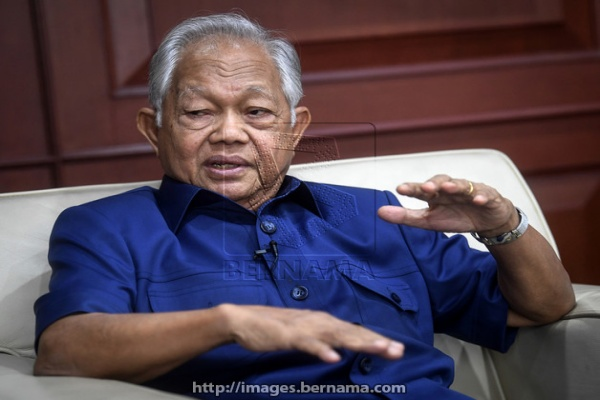News
TNB excited over growth prospects, says Moggie

By Yong Soo Heong
KUALA LUMPUR, May 12 (Bernama) -- Tenaga Nasional Bhd (TNB) is excited over growth prospects that will see it delivering even better services, catalysing new market growth by unlocking the value of network assets and improving sustainable value for its stakeholders, says chairman Tan Sri Leo Moggie.
“We see this as part of our unwavering commitment and contribution to realise the nation’s ambitions,” he said in TNB’s financial year 2018 (FY2018) integrated annual report, which also detailed much of the power utility’s progress over the past 70 years.
Through the strategic efforts initiated under its Reimagining TNB (2017-2025) blueprint, Moggie said TNB continued to register revenue growth and healthy profits, fostered by a conducive regulatory environment.
TNB’s group revenue grew 6.3 per cent from FY2017 to RM50.39 billion for the year ended Dec 31, 2018, driven mainly by higher electricity demand which peaked in August 2018 to 18,338 megawatts, a rise of 3.1 per cent over FY2017.
Net profit for FY2018 was lower at RM3.75 billion compared to RM6.91 billion in FY2017, mainly due to regulatory adjustment as a result of regulatory changes in the Second Regulatory Period (RP2) (2018-2020), impairment, and foreign exchange translation.
Electricity demand continued its positive momentum in FY2018, with annual electricity sales increasing 1.4 percentage points than initially projected under the RP2 of the Incentive Based Regulation (IBR) framework.
Moggie said the sustainable ecosystem afforded by the IBR framework and the Imbalance Cost Pass-Through (ICPT) mechanism implemented in the last four years by the Energy Commission had resulted in Malaysia having one of the most reliable energy networks in the region that was on par with other advanced countries.
By taking a proactive and forward-looking approach, he said TNB had undertaken preparatory works to gear itself for the Third Regulatory Period (RP3) (2021-2023) and it was expected to submit its IBR RP3 proposal by December this year.
With constant technology disruptions affecting the industry, Moggie said TNB, which recorded a commendable 99.97 per cent system availability in 2018, believed that it was important for the Malaysia Electricity Supply Industry (MESI) to be prepared for the oncoming fundamental shifts impacting the global electricity industry.
Saying that the government’s timely reform efforts through MESI 2.0 was a key step to prepare the industry ahead of global trends, he said there was a rising need to future-proof Malaysia’s industry structure and regulations, and to empower consumers to make smarter choices in a more democratised and decentralised setting.
Having anticipated these market-wide reforms, he said TNB had launched its strategic plan under Reimagining TNB by putting in place a solid foundation and transforming its internal processes and structure to enable the power utility to be more technologically-advanced and cost-optimised compared to four years ago.
As electricity demand continues to increase in Peninsular Malaysia, TNB has been building a 500kV Grid Superhighway costing RM2 billion since 2015.
The 500kV Grid Superhighway, expected to be ready next year, will enable adequate and safe power transfer from other regions into TNB’s Central Area of Peninsular Malaysia, which accounts for about 45 per cent of the entire peninsula’s electricity demand.
The grid network will function as the backbone of TNB’s electricity supply chain, transporting bulk electricity from power generators to the distribution network to brighten homes, offices and commercial spaces, while supplying directly to industries for manufacturing.
In terms of dividend payout, Moggie said TNB remained committed to creating long-term value for shareholders by consistently delivering optimum dividends for each financial year.
For FY2018, TNB had approved a single-tier interim dividend of 30.3 sen per ordinary share amounting to a dividend payout of RM1.72 billion (paid in October 2018) and a final single-tier dividend of 23.0 sen per ordinary share amounting to a dividend payout of RM1.31 billion.
With this, TNB’s total dividend in FY2018 amounted to 53.3 sen per ordinary share at a total value of RM3.03 billion. The dividend payout was equivalent to 55.8 per cent of the adjusted group profit after tax and minority interests (PATAMI) (excluding extraordinary and non-recurring items) for FY2018, which was in line with TNB’s revised dividend policy of between 30 per cent and 60 per cent of Group PATAMI.
Moggie said TNB, which aspires to be among the Top 10 Global Utility Companies by market capitalisation in 2025, was confident that its highly-skilled workforce, coupled with the measures executed under its Reimagining TNB strategy would position the Group favourably to capture new opportunities in the future.
– BERNAMA
Other News
Sarawak Lepasi Sasaran Kapasiti Gabungan Tenaga Boleh Baharu Tahun Ini - Abang Johari

Oleh Nur Ashikin Abdul Aziz
SINGAPURA, 21 Okt (Bernama) -- Sarawak mencapai 62 peratus sasaran campuran kapasiti tenaga boleh baharu (TBB) tahun ini, melepasi sasaran 60 peratus yang digariskan dalam Strategi Pembangunan Pasca COVID-19 (PCDS) 2030.
Sarawak Pacu Pertumbuhan Tenaga Boleh Diperbaharui Untuk Manfaat ASEAN - Premier

SINGAPURA, 21 Okt (Bernama) -- Sarawak komited menyokong peralihan tenaga boleh diperbaharui di Asia Tenggara dengan memanfaatkan potensinya sebagai "Bateri ASEAN," yang akan membekalkan tenaga bersih menerusi sambungan Grid Kuasa Borneo dan ASEAN.
Belanjawan 2025 Percepat Peralihan Kepada Tenaga Bersih - Solarvest

KUALA LUMPUR, 19 Okt (Bernama) -- Belanjawan 2025 merupakan satu langkah ke arah mempercepat peralihan kepada tenaga bersih di Malaysia, kata Solarvest Holdings Bhd.
© 2025 BERNAMA. All Rights Reserved.
Disclaimer | Privacy Policy | Security Policy This material may not be published, broadcast,
rewritten or redistributed in any form except with the prior written permission of BERNAMA.
Contact us :
General [ +603-2693 9933, helpdesk@bernama.com ]
Product/Service Enquiries [ +603-2050 4466, digitalsales@bernama.com ]